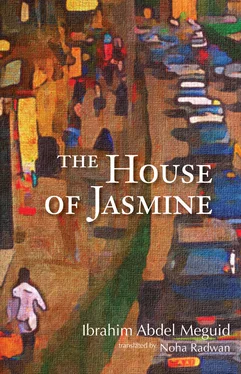This sounded like a serious matter, but I had a feeling that Usta Zinhum was lying. Nobody seemed very concerned about these upcoming elections, neither the union members nor the workers, the engineers or the managers. Everyone just shook my hand with a wide smile and wished me success. No one really discussed anything important or asked me why I was running. The only thing that left a significant impact on me was that I had spent more than a hundred and fifty pounds on publicity so far. I did what Zinhum wanted me to do, but I wasn’t going to retreat. Now I wanted to be the president of the workers’ union. My first decision as president would be that the shipyard never take part in reception rallies again. I would put an end to Usta Zinhum’s dreams.
I began hanging out at cafés until midnight, when I would return to my apartment completely exhausted. All I found at the cafés were workers who were there to play backgammon or dominoes, cheer for the winner and boo at the loser. They always invited me to have tea or coffee, and I always insisted on paying for all the drinks. One of them turned to me once and said, “The most important thing, Mr. Shagara, is that you do something for Imbabi.”
“Who is Imbabi?” I asked.
“Don’t you know him?”
“No.”
He looked at his colleagues in disbelief and then said, “He is the oldest worker in this shipyard. His is quite a story. Poor Imbabi!”
I remained silent, so he went on: “Fifteen years ago, when this shipyard was still a new project, the land was still part of the sea, which they were filling. Trucks came loaded with stones and dirt and dumped them into the sea. Imbabi was one of the workers who leveled the newly filled lands. He had just moved from the south with his younger brother. One day, his brother fell into the water and could not be rescued. The divers never found him, and the sea never threw the body back to the shore in any part of Alexandria. Since that day, Imbabi has never left the shore. He comes in before any of the other workers to sit in front of the water and call out: “Imbabi, Imbabi.” His brother too was named Imbabi. He slaps his cheeks and his eyes remain fixed on the water and the fishing lines he sets to catch fish. He sets several lines and ties the end of each line to a large rock so that the fish can’t run with the line. Every time one of the lines moves, he quickly pulls the fish out of the water, crushes it with a piece of stone, then throws it back, as far as he can, into the sea. At three o’clock exactly, Imbabi pulls his lines out of the water and prepares to leave with the other workers, his face red and his hands cut and scratched. He still doesn’t believe that his brother is dead, or that the fish that ate him will never bring him back. But how come you didn’t know about Imbabi?”
The story, in fact, came as a complete surprise to me, and for a few moments, I thought that the worker was lying, but another worker said, “What do you want him to do for Imbabi? The shipyard still pays him his salary even though everyone knows that he hasn’t worked in fifteen years. Do you want him taken to the mad house? The man is old and has lost his teeth and most of his eyesight. He will die sooner or later.”
#
That night, I heard a movement in the apartment next to mine. The next morning was Friday and I woke up early even though I had become accustomed to sleeping later since I decided to run for the elections. I stood on the balcony with the idea of watching the sea, but I saw four pretty young women hanging their wash out on their balconies and exchanging greetings. So the building had filled with neighbors who had come to know each other. What a terrible thing I was doing to myself — I, who came home in the middle of the night dragging my feet like two sacks of sand, woke up early, when the men who had these beautiful wives were still asleep! I thought that exhaustion was of two types: one makes you go to sleep just to get rid of it, like a machine that is turned off to rest for a while, which is what I did, and another that puts you to sleep and takes you to the land of sweet dreams, and that type was for the husbands of these women.
#
The date of the elections drew near. All I cared about then was that they would be over so that I could get some rest. I had already spent two hundred pounds on publicity. I had no way out of it now. I consciously avoided going near the sea in my tours. I didn’t want to see that Imbabi. In fact, I sometimes became very enthusiastic about the campaign despite the indifference that prevailed around me. I was overcome by a strong desire to win for a reason which I cannot reveal now. I didn’t notice that my visits to the different cafés often took me near Hassanayn’s house in Qabbari. Once, when I was sitting at the Lansh Café with a bunch of workers, all smoking ma’asil, their mouths opening strangely to blow out the smoke as they talked, I saw Hassanayn walking toward me with his pleasant smile, “You are here, so close to my house, and haven’t come to visit me?” he asked. I held his hand and invited him to sit down. A moment later he noticed the workers gathered around me and was a little confused.
“Hassanayn, a friend of mine,” I said, introducing him.
“We know him,” a few of them said. “It is only he who doesn’t know us.” They started telling him where each one of them lived while he became even more confused and started to blush. I was annoyed by this useless talk.
“A campaign effort,” I said, and he only smiled. I knew that he didn’t believe me, or rather didn’t understand what I meant, but the workers started talking to him about their pride at being represented by me, telling him about the conspiracies against me and their efforts to sabotage these conspiracies and defend my reputation. “Mr. Shagara isn’t distant from the workers. He knows them better than anyone. He has the files, and the files have everything about everyone.” This was the first time I heard about any conspiracies against me. Hassanayn led me out of the café, and said: “Why didn’t you come over? Ibtihal chose two girls for you to meet, and we had it all arranged.”
“I came more than once, and couldn’t find you, neither at home nor at the café. I told Magid about it and asked him what you were doing.”
“Magid never told me a thing,” he said, and after a pause I asked, “What should we do now?”
“Nothing,” he answered. “Both girls got married. It’s summertime, and the expatriates returning from the oil countries snatch up everything that isn’t nailed down!”
That made me laugh, after my anxiety. It struck me that he was trying hard to help me, but I couldn’t be too upset with myself. As he was preparing to leave, he turned to me and said, “By the way, Hagg Luqman used to sit at this café in his early days. I will come visit you some day.”
#
I heard loud knocks on my door. I wondered who could it be at six o’clock on a Friday morning. For a moment I felt scared. I had no parents, siblings, or relatives who could be at the door. Annoyed, I went to open the door.
“Garbage?” said the man who was standing there in an incredibly dirty galabiyya, with an old jacket over it and carrying a large basket. I was confused for a moment, then I said, “There isn’t any.”
Then I closed the door and stood in the middle of the hallway. So a garbage collector is now coming to our building. It has filled with residents who have made such arrangements for daily life, and I didn’t know. Until the day before, I had been throwing my garbage into the sea. I needed sleep badly. The night before had been election night, and I had won with the highest number of votes. I went back to bed, and fell asleep immediately.
Читать дальше












